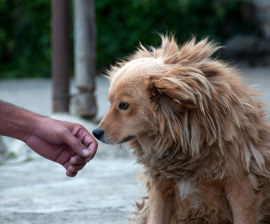-

Prayer flags wave in the background of this sleeping dog. The flags bring good luck and merit to all sentient beings. Kathy Milani/HSI
-

HSI sterilized about 70 dogs at this monastery outside of Thimphu. An ear notch indicates a dog has been sterilized and vaccinated against rabies. Kathy Milani/HSI
-

Prior to HSI’s nationwide spay/neuter program, street dogs were rounded up and mass-sheltered, which even the government realized was inhumane and ineffective. Kathy Milani/HSI
-

In addition to reducing the overpopulation of street dogs, another goal is to make Bhutan rabies-free. Kathy Milani/HSI
-

HSI has field teams working across Bhutan; each can perform about 20 spay/neuter surgeries per day. Kathy Milani/HSI
-

Dogs are released later the same day in the same location where they were captured. Kathy Milani/HSI
-

Puppies with their mother. Kathy Milani/HSI
-

People may provide food and water, but street dogs do not receive veterinary care and are not allowed to live inside homes. Kathy Milani/HSI
-

During a five-month period, HSI sterilized and vaccinated 2,400 dogs in Paro. Kathy Milani/HSI
In September 2009, the Ministry of Agriculture and Forests, Department of Livestock of the Royal Government of Bhutan (RGOB) and Humane Society International (HSI) formed a unique partnership. With the signing of a Memorandum of Understanding, the two entities embarked on a first-of-its kind, nationwide spay/neuter/vaccination program throughout the country of Bhutan, targeting more than 50,000 dogs over six years.View a video about our work in Bhutan.
Need for action
Like many developing nations, Bhutan has faced the problem of how to deal with the overwhelming number of dogs roaming the streets. Eventually, negative reactions by tourists to the presence of street dogs and non-stop nightly barking prompted the administration of the RGOB to take action.
HSI was introduced to the RGOB through the Bhutan Foundation, a U.S.-based organization with years of experience of working in Bhutan. Based on this introduction and a series of conversations with the RGOB, HSI was invited to give advice on handling the situation. We began planning a mass spay/neuter/rabies vaccination program using the Catch-Neuter-Vaccinate-Release (CNVR) method.
Status of program
After three years, HSI and the RGOB extended the agreement to keep the program going for another three years, with the aim to ensure sustainability of dog population management in Bhutan and for the RGOB to eventually run the program independently. As of June 2014, we had sterilized and vaccinated more than 50,000 animals.
Initially, there was a shortage of veterinarians in Bhutan, and HSI offered to deploy our Indian veterinary teams to Bhutan to begin the project. Bhutanese personnel, such as vet assistants and dogcatchers, were included on the teams from the start.
In the first few years of the project, more than 30 Bhutanese underwent extensive veterinary training in India. On their return home, they participated in an HSI CNVR training to ensure the highest standards possible of CNVR, passing on their newfound skills to their colleagues with the the team now consisting of 100% local veterinarians and para-veterinarians. It has been heartening to see local participation in the program through the newest initiative, a “Community Animal Birth Control Program” that sees people from all over the country bringing their pets to one of the 20 District Veterinary Hospitals on “Tuesday—Love Your Dog Day.” This only strengthens our belief that it will continue as a sustainable, locally run initiative across the 20 districts of Bhutan in the future.
Security for people and animals
Our program is designed not only to humanely and effectively address the dog overpopulation problem in Bhutan, but also to help people and dogs live more comfortably in each other’s presence. Most dogs in Bhutan are “community dogs,” which means they live within a certain territory or neighbourhood and rely somewhat on human charity for survival. They are not considered pets, but are still tolerated and in some cases, cared for, by local people in a given location. In turn, the dogs provide a sense of security. Unfortunately, a fear of rabies, continuous litters of puppies, and the aggression sometimes seen can create friction in this otherwise harmonious relationship. Our dog population management program is helping to alleviate these concerns and more.
